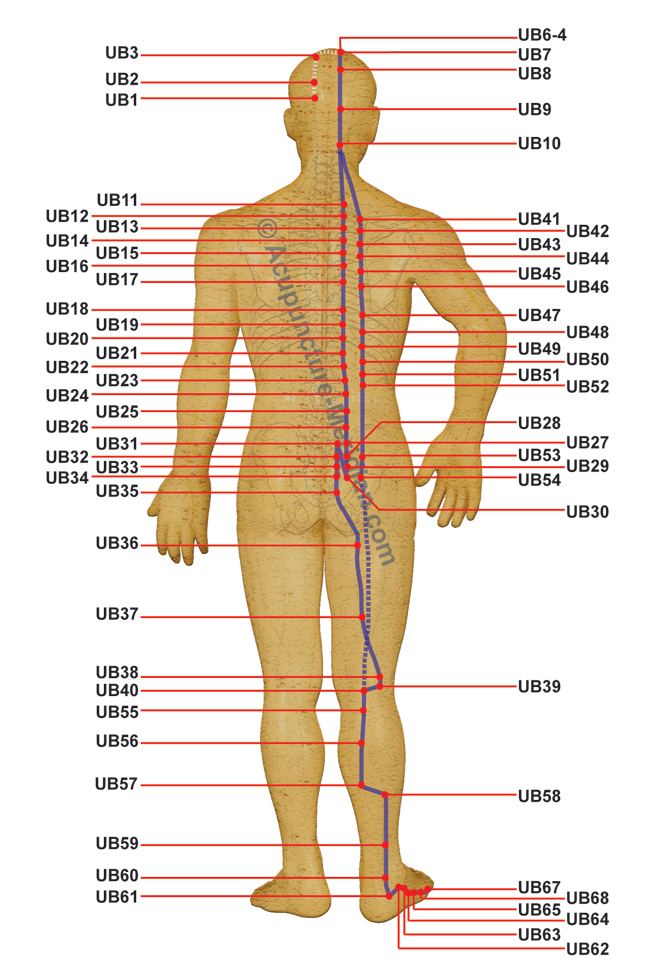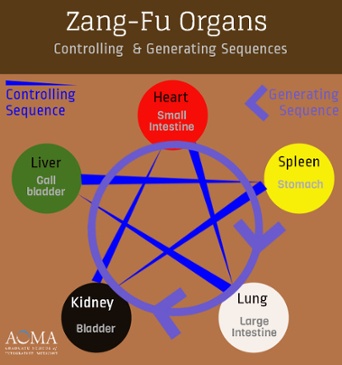
Opening the Diaphragm: Treatment of Depression with Acupuncture
The “Water Element,” comprised of the systems of the Kidney and Bladder organs and channels, is of primary interest in Chinese Medicine. It is the battery pack of the body. It supports and regulates all other organs in the body. It also manages the willpower: the drive to interact, the will to live and engage.
A situation I often treat in my acupuncture clinic is depression. This is a complex condition with many variations. In this article I want to explore depression that’s accompanied by withdrawal from social interaction, often with flights into fantasy behavior and distraction. This is quite common in our culture. People escape from the world into marijuana and other drugs, alcohol, television, pornography. Some people go so far as to create alternate personalities and secret lives to escape into. Depression is not always a state of sadness; it can often be a state of withdrawal and non-interaction. It can also be an inversion state, where a person goes into himself or into a fantasy world divorced from their daily reality. This can be mild as in role-playing or dressing up, or severe like in the case of schizophrenia.
Depression (Yu) has been an area of focus in Chinese Medicine for centuries. One of the foremost Chinese doctors interested in depression was 12th Century scholar Liu Wan Su (1120-1200 CE). His main interest (and belief) was all disease was due to inflammation. Every condition either originated from too much heat in the body, or transformed into heat. However in his treatments for clearing heat he placed special emphasis on the Diaphragm. Su linked depression to stagnation of the diaphragm, classifying it as one of the major causes of disease.
Chinese medicine commonly classifies disease as originating from 4 major sources: the external world: its germs and climate, the internal world or the emotions and diet, lifestyle choices (which can be seen also as thought patterns and habits) and constitutional factors (ancestry). The Diaphragm plays a role in all of these disease etiologies.
The Diaphragm is the separation between the external and internal aspects of the body. Below the chest and above the abdomen, the Diaphragm acts as a type of border. It is reliant on the energetics of the Lungs and Liver systems chiefly. It is part of the mechanism by which the Lungs are able to release stress and pathogen from the chest; it is also the way breathing is maintained, as well as defecation and urination: the lower methods of elimination.
When the Diaphragm becomes stuck, we lose capacity to full let go or eliminate. We also lose capacity to circulate and create. It’s interesting to note that a major acupuncture point on the back of the body is designated both the “transport” point for the Diaphragm as well as the “Influential” point for blood (BL-17 Geshu). When the Diaphragm is not working well, it will impact both the circulation as well as the creation of new blood.
In relationship to depression as we modernly think of it, when the Diaphragm becomes stuck we stop breathing deep. We also stop circulating and creating abundantly. Diaphragm stagnation inhibits the two major Axis of Qi and Blood in the body: the chest and the abdomen. We stop interacting well with both the inner and outer world. But more importantly the communication and exchange between the two worlds becomes diminished. This creates inflammation, because anything that becomes stagnant in the body will generate heat pressure. Inflammation causes irritation and vexation, and it also consumes the body’s resources: its blood, fluids and qi-energy.
The variations of depressive behavior is due to the stagnation of blood that occurs due to Diaphragm constriction. Blood not moving well will pool. Chinese medicine discovered that the blood has a strong impact on the mind and emotions. They actually say the “Shen” (mind-spirit) rides the blood as it circulates through the body. It’s the power of the Lungs and its respiratory function that pulses the blood through the circulatory system. And it’s the Liver that maintains proper movement and balance in the abdomen, helping the various digestive organs to harmonize and work together. The Diaphragm is the tool used by all of these major organs.
When the Liver blood becomes stagnant due to depression, the person can start to fantasize. It is described in the medical classics as sexual fantasizing. But I’ve come to see it can be any type of creating alternate realities to live inside. This can even include zoning out to television or video games. It also can include role-playing or creation of characters to play out different personality scenarios. The Liver can be seen as a balance to the Lungs. For the body to work at its best, the energies of the Lungs and Liver must be equal and mutually supportive. When the Diaphragm becomes stuck, the Lungs will usually become hypo-active while the Liver becomes hyper-active. Philosophically this means we sacrifice living in the present moment for fantasy. It also tends to create a tendency to hold onto emotions and memories rather than let them go. Oftentimes the fantasies being played out through the Liver’s blood stagnation bear relationship to the past: either situations that have happened or that we wish would have happened.
There are several important acupuncture points that have a strong effect on the Diaphragm. They are respectively the point designated as “Influential” for Qi (vitality and movement) and Blood: CV-17 and BL-17.
Another point I find very effective in regulating the Diaphragm is the point KI-21 “The Dark Gate.” This point sits at the very top of the classical rendering of the Kidney’s acupuncture channel right below the chest. It is said to be a gate between the abdomen and the chest. The abdominal Kidney points regulate the relationship between digestion and respiration, and also between the Willpower (Zhi) and mindfulness (Yi). The points on the chest which were added to the Kidney’s acupuncture channel later in history are “spirit points,” which have the capacity to “transport.” They have evocative names like “Spirit Burial Ground,” “Seal of the Spirit,” “Spirit Storehouse.” The have relationship between the Lungs, Heart and Kidney: the corporeal or physical soul (Po), the spirit (Shen) and our Essence. KI-24 “Spirit Burial Ground” is amongst the most popular points for treating depression modernly. It is said to “resurrect” the soul when it is exhausted.
KI-21 as the “Dark Gate” can mediate the passage between the abdomen and chest. This can be a difficult passageway. Another translation of this point is “Mysterious Gate.” The difficulty of this passage is illuminated by some the lower points on the Kidney channel, especially the point KI-8 whose name evokes images of an intersection, faith, belief systems and trust.
Many people suffering from depression will complain of feelings of futility or even fear, dread or meaninglessness. Life is mysterious. In spite of all our social and religious belief systems, none of us know why we are here or what life is about. Much less do we know about what is going to happen in the future. The ability to wake up and interact with the world is built on faith and trust. We go out into the mystery without knowing what will happen or what kind of purpose there is to it all. The ability to do this comes from the Kidneys and its Zhi (willpower). It possesses an innate capacity to want to live, a drive to interact and achieve and explore. The area around KI-21 and the diaphragm is a common area where the Kidney energy can get stuck. This is why this junction is such a difficult passage.
Philosophically the body is a spiritual map. The area of the abdomen is the region of thought. But the region of the chest is about surrender. We may possess the power, strength and will to think things through, but to get past the “Mysterious Dark Gate” into surrender takes another more subtle form of power. It take a courageousness that allows us to jump off the cliff into the unknown as we live. To interact in spite of the mysterious and unclear meaning of it all.
We must cultivate our Kidney energy so we can pass through the Diaphragm and joyfully enter the mystery of life.











No Comments